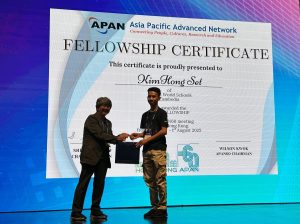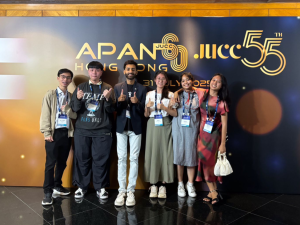There are serious medical disparities worldwide. The factors contributing to this disparity have been analyzed in various ways, including economic status, political composition, race, gender, educational background, and social class. However, differences in the diagnostic, therapeutic, and other skills of medical professionals are also said to be one of the causes of the medical disparity. The enhancement and dissemination of telemedicine programs utilizing information and communication technology (ICT) that enable busy medical professionals to acquire ever-evolving cutting-edge medical knowledge and skills and to receive advice from overseas experts is increasingly expected to reduce medical disparities in the future.
Since 2005, the APAN Medical Working Group has been working on international telemedicine conferences, commonly held in clinical settings between facilities in remote locations across countries. However, dedicated staff to support the implementation of such conferences were only available in some medical facilities in Asia, which was an obstacle to our activities. Although online conferences are now common, their use was still limited before the coronavirus disease 2019 (COVID-19) pandemic, with dedicated terminals available only between registered facilities. Therefore, for international telemedicine conferences to be conducted on demand, information technology (IT) engineers who could comprehensively handle everything from equipment selection to setup, connection testing, and troubleshooting were needed.
Very fortunately, in the 4 years from 2015 to 2019, just before the COVID-19 pandemic, we resolved this issue with continuous funds from the TEIN4 (2015–2018) and the Asi@Connect projects (2017–2019). We invited and provided training to many physicians and engineers from hospitals in developing countries throughout this period. Finally, 417 physicians and IT engineers from 13 countries, including Indonesia, Vietnam, the Philippines, Nepal, Thailand, India, Malaysia, Myanmar, Bangladesh, China, Sri Lanka, South Korea, and Taiwan, were invited for the advanced engineering training for telemedicine. We also organized domestic telemedicine workshops in the Philippines, Indonesia, Vietnam, Myanmar, and Nepal to expand networking among physicians and IT engineers for telemedicine activities in these countries. Furthermore, through the network formed by these activities, we created a telemedicine manual in 2017, and many new research projects have still been developed.
As many people could have imagined, the members trained in the projects played a pivotal role in telemedicine activities at their hospitals during the pandemic. Some of the hospitals established telemedicine centers led by members of the project. The human resource development provided by this project has been a cornerstone in promoting the use of ICT in medicine and has helped many patients and medical staff.
APAN Medical Working Group will continue to engage in ongoing and developing exchanges with them and will support the use of ICT in the ever-evolving medical field.
 Engineering workshop at APAN 46 Medical Working Group, 2018 New Zealand
Engineering workshop at APAN 46 Medical Working Group, 2018 New Zealand
 Participating engineers
Participating engineers
 The 45th APAN Meeting, Hepato-Pancreatic- Biliary session connecting Korea, Singapore, Nepal, Malaysia, Thailand, and Japan
The 45th APAN Meeting, Hepato-Pancreatic- Biliary session connecting Korea, Singapore, Nepal, Malaysia, Thailand, and Japan
Training scene

Training scene

Training scene

Training scene

Training scene
Program of the domestic workshop

Published engineer manual

Promotional goods produced by this project







